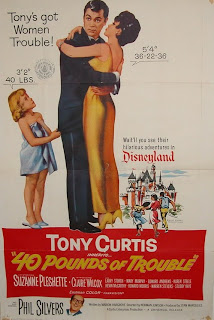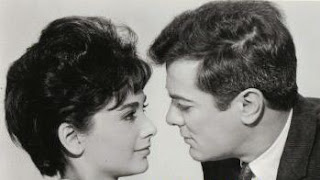
I admit it. I miss the comedies of the '60s. They were breezy and stress-free and there was nothing mean-spirited about them. Yes, times have changed. Either that, or I've become way too old.
The average modern film comedy leaves one feeling battered and worn out, even the so-called "chick flicks" and romantic comedies. Face it, the romantic comedy died in that Rob Reiner-concocted scene in which Meg Ryan fakes an orgasm in a deli/restaurant.
Today, there is no more exposition - nothing is set up as modern comedies come barreling at us with veritable cattle prods in hand, zapping us every five seconds or so with dubious double-entendrés and CG-enhanced pratfalls.
The problem with all of this? Most of the time, it simply isn't funny - just strained.
Which brings me to two minor gems from the 1960s, both starring the ever-underrated Tony Curtis.

1964's "Wild and Wonderful," directed by Michael Anderson ("Around the World in 80 Days," "All the Fine Young Cannibals"), is a nifty take on the eternal triangle. Only in this case, it's a dog - a handsome white French poodle - that comes between a man and a woman.
Monsieur Cognac is a national celebrity in France, the star of his own TV show, as well as films, and he's completely in love with his owner Giselle Ponchon (Christine Kaufmann, Curtis's wife at the time), obsessively so. Giselle has an acting career of her own, but Cognac always comes first.
One day, Cognac disappears and goes on a bender. He meets Terry Williams (Curtis), an American musican performing in Paris, and in one of the film's more hilarious scenes, Terry and Cognac indulge in a drinking spree. True to his name, Cognac loves alcohol. When Giselle tracks down her dog and meets Terry, she falls madly in love - much to Cognac's chagrin. The rest of the film is aout how a disapproving Cognac sets up roadblocks for Terry and Giselle, feigning illness and even abuse (supposedly at the hand of Terry) and generally acting out.
"Wild and Wonderful" is effortless fun. George Clooney should do a remake (with Marion Cotillard, perhaps?). And Universal should release it on DVD already.

A year earlier, in 1963, Curtis made an affable Universal comedy for a first-time director named Norman Jewison - "40 Pounds of Trouble" - about a casino manager who gets stuck with an orphan as a marker.
Sound familiar? Jewison's debut film is, of course, based on the famous Damon Runyon story, "Little Miss Marker," which has inspired at least three other film versions - Alexander Hall's "Little Miss Marker" (1934) with Adolphe Menjou and Shirley Temple; Sidney Lanfield's "Sorrowful Jones" (1949) with Bob Hope and Lucille Ball, and Walter Bernstein's "Little Miss Marker" (1980) with Walter Matthau, Julie Andrews and, again, Tony Curtis.
In Jewison's version, Curtis plays Steve McCluskey who manages a Lake Tahoe casino for Bernie Friedman (Phil Silvers). He's trying to juggle his job with his attempts to evade the private eyes hired by his ex-wife to collect past alimony.
Complicating matters are (1) Bernie's niece, Chris Lockwood (Suzanne Pleshette), who arrives to sing at the casino and who Steve thinks is actually Bernie's mistress, and (2) a 6-year-old named Penny Piper (Claire Wilcox), who has been abanonded by her father who owed the casino money. When Penny's dad ends up dead, she ends up with Steve.
It all culminates in an antic chase through Disneyland, with Steve trying to evade his assorted pursuers, using Chris and Penny to pose as the perfect family. Pure pleasure.
The exceptional supporting cast includes such pros as Silvers, Kevin McCarthy, Howard Morris and Edward Andrews. Better yet, Pleshette matches up well with Curtis - they make a hugely attractive couple - and gets to sing in a few scenes.

Jewison followed "40 Pounds of Trouble" with Doris Day's "The Thrill of It All," made the same year and directed from a great script by Carl Reiner. A year later, in '64, Day recruited Jewison to direct her and Rock Hudson in the best of their three comedies together, "Send Me No Flowers," based on the Norman Barasch-Carroll Moore Play.
Next came "The Cincinnati Kid" and "The Art of Love" (both 1965), "The Russians Are Coming, The Russians Are Coming" (1966) and then Jewison's Oscar winner, "In the Heat of the Night" (1967).
A nice, steady rise.
Cinema Obscura is a recurring feature of The Passionate Moviegoer, devoted to those films that have been largely forgotten. Suggestions welcome.
(Artwork: Tony Curtis eavesdrops as Christine Kaufmann converses with Monsieur Cognac in Michael Anderson's "Wild and Wonderful"; Curtis himself has a word with Cognac; the poster art for Norman Jewison's "40 Pounds of Trouble", and Curtis and Suzanne Pleshette in a scene from the film)
* * *
Anyone interested in perusing some 2060 of my film reviews, dating back to 1994, can do so by simply going to RottenTomatoes.Com
No comments:
Post a Comment